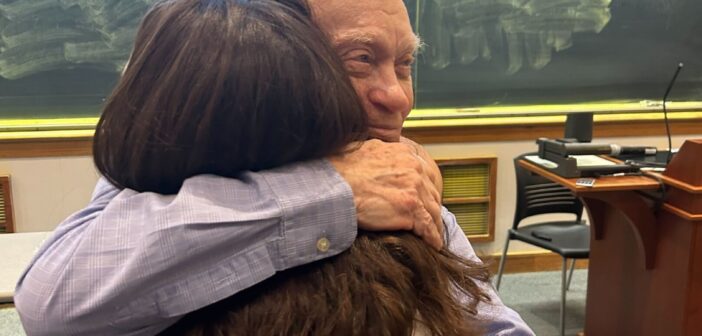Sami Steigmann, a Holocaust survivor, is dedicated to sharing his story with younger generations in hopes of preventing history from repeating itself.
Steigmann was less than 2 years old when he and his parents were captured by Nazi soldiers and sent to a labor camp for three years. As an infant, he was subjected to medical experiments during World War II.
If it wasn’t for an anonymous German woman who snuck him milk at the labor camp, Steigmann would have died of starvation.
Later in his life, German officials acknowledged Steigmann’s experiences in a letter and paid him reparations.
Steigmann came to the Rauch Business Center on Sept. 27 to discuss his life story and remind young people of the power they hold, especially with social media, and to educate others about the truth.
He has dedicated his life to educating people by speaking to schools, organizations and media outlets. He said he never wants stories like his to be forgotten and that they encourage his listeners to find community and stand against hate.
“To the world, you are one person, but to one person you are the world,” Steigmann said during his speech. “We have to be united and we have to help each other.”
Many Jewish students who attended the event stressed the importance of educating fellow students about Jewish history and hearing firsthand accounts to cultivate empathy for the community.
Aliya Dworkin, ‘25, said she thought it was important for all students to listen to Steigmann, especially since a lot of students didn’t grow up hearing about the Holocaust.
“I think right now we’re living in a very divisive time,” Dworkin said. “I think hearing about past experiences, especially from someone who lived through it themselves is crucial.”
Another student, Frankie Prekop, ‘28, said he grew up hearing stories from the Holocaust and believes everyone should know about that part of history.
He said he was shocked when he met someone last year who had never heard of Auschwitz, one of the largest concentration camps during the war.
“I am the grandchild of two Holocaust survivors and so I have grown up with the stories about this, but as I’ve experienced life, I have met a lot of people who have no idea what the Holocaust (was) like,” Prekop said. “I just feel people should know that it happened.”
Tyler Katz, the engagement and programming associate for the Office of Jewish Student Life, said it’s important for people to know about the Holocaust, what caused it and what’s happened since then.
“A lot of people have a surface level understanding and I think people really need to know, truly know what’s happening,” Katz said. “They need to hear it from the sources themselves, they need to hear it from the people who lived through this.”
Katz also said it’s important for Jewish students to immerse themselves in the culture, remember what makes it special and celebrate traditions that give students a way to build community.
Lehigh has several communities on campus where Jewish and non-Jewish students can attend events and learn more about the culture.
Rabbi Steven P. Nathan, the director of Jewish Student Life, said Steigmann’s talk was a valuable chance for students to gain a sense of community. He also said since there aren’t many Holocaust survivors left, it’s important to hear them speak while they are still alive to share their stories.
Nathan also said his office has a 5×10 planned for October that will discuss the history of antisemitism and steps students can take to combat it.
“Any oppressed minority — or anybody who’s oppressed in any way — needs allies,” Nathan said.






Comment policy
Comments posted to The Brown and White website are reviewed by a moderator before being approved. Incendiary speech or harassing language, including comments targeted at individuals, may be deemed unacceptable and not published. Spam and other soliciting will also be declined.
The Brown and White also reserves the right to not publish entirely anonymous comments.
1 Comment
I am not a Holocaust Survivor in the strict sense of the word; but my family, including myself
left Checoslovaquia by chance ( my grandfather, a very poor farmer,managed to get us visas from Argentina where I grew up .
To make a very long story short: my mother lost all her family in the holocaust, my father lost about half , of his .Just a few cousins, on my father ‘s side survived, an settled in Michigan , where their children grew up.
If it wasn’t for my poor grandfather in 1938 , having sold the few cows that he owned,to pay for our visas ,in Argentina, my family would not be here!
I wish I would’ve known this when he was still alive, to give him some recognition, for such sacrifice!
I grew up myself ,in a very deprived farming community in Santa Fe province, Argentina.
Went to Medical School in Buenos Aires , where most of my family still lives,and graduated from Medical School.
I emigrated to the USA , to get further training,.
I am living in a suburb of Chicago, Il, and I am a practicing Psychiatrist .
That is a “ short “ story, and I should be able to understand antisemitism. But I don’t!